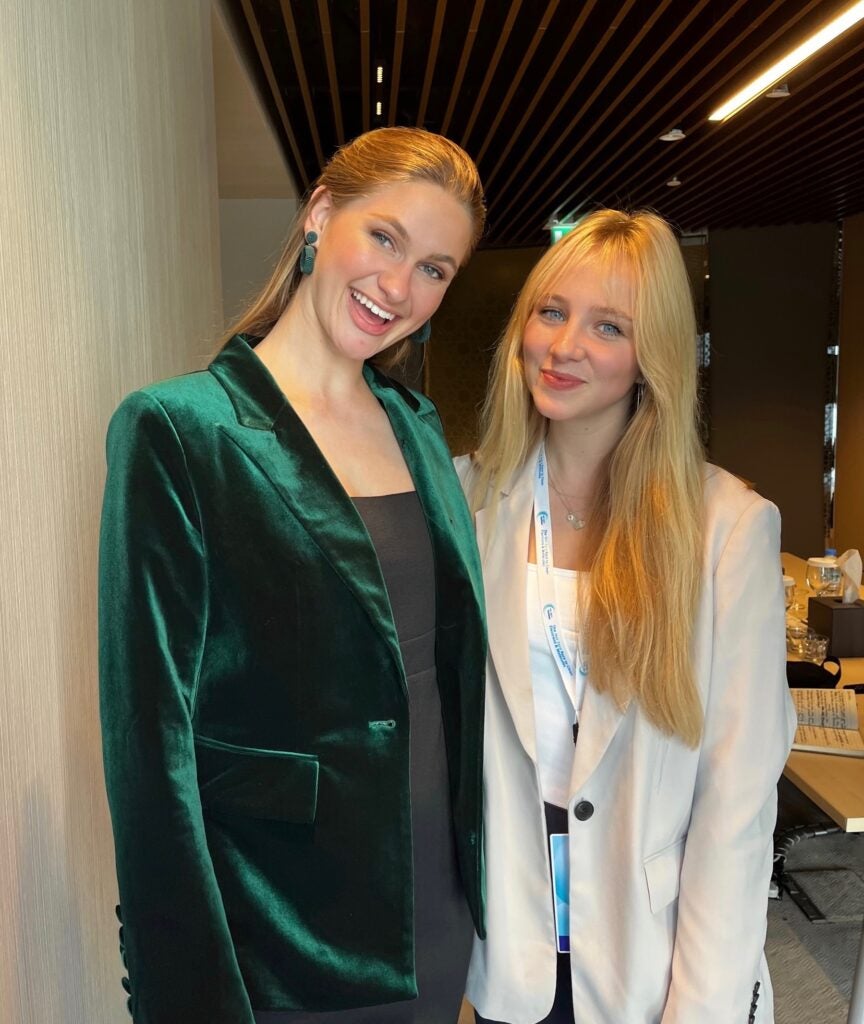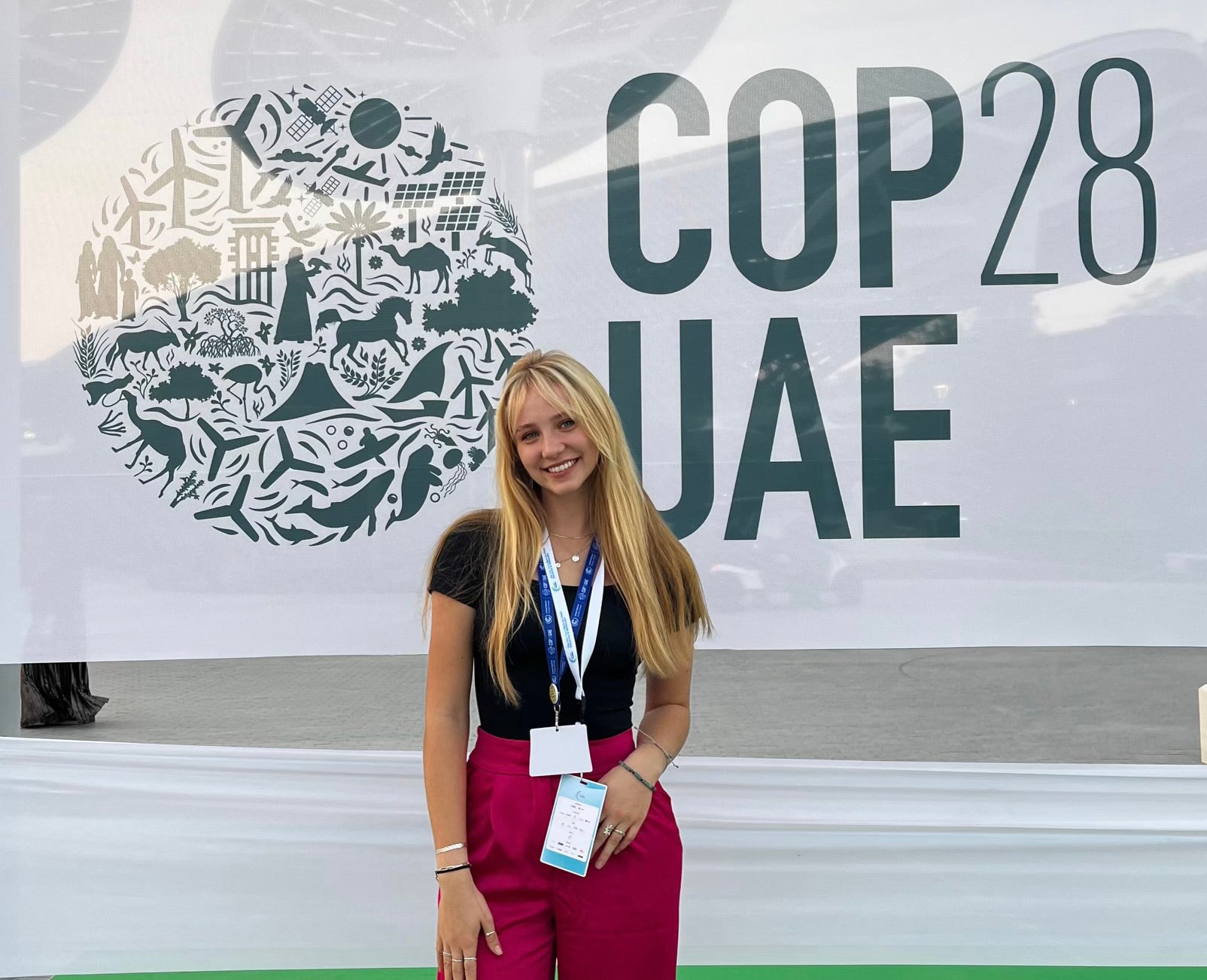KINGSTON, R.I. – Dec. 19, 2023 – As a teenager, Kiersten Sundell was inspired by environmental activist Greta Thunberg. They were the same age, both of Swedish descent and both interested in raising awareness about climate change.
“Since I first learned about climate change as a 14-year-old in public school, I saw Greta on TV. She was probably 15, yelling at some of the world’s most prominent politicians,” says Sundell, a University of Rhode Island junior from Thomaston, Connecticut.
And like Thunberg, she wanted to be an activist with the platform to inform everyday people about global warming and alternative energy sources.

Sundell got that chance in mid-December when she traveled halfway around the world to advocate for clean energy at the United Nations Climate Change Conference in Dubai, United Arab Emirates. Sundell, a triple major in environmental science and management, political science, and wildlife and conservation biology at URI, made the trip as part of Generation Atomic, a grassroots group that advocates for nuclear power and other clean energy alternatives.
At the conference, Sundell, a part-time communications director, met dignitaries from numerous countries, along with several members of the U.S. House of Representatives; Kathryn Huff, assistant secretary of the U.S. Office of Nuclear Energy; and Miss America Grace Stanke.
“It’s just not something that 20-year-olds typically get to do,” she says.
At the COP28 conference, negotiators from nearly 200 member nations reached a sweeping global agreement calling for a transition away from fossil fuels–such as oil, gas and coal–the chief cause of global warming. The conference, which attracted 85,000 participants, also called for nations to triple production of renewable energy and slash carbon dioxide emissions.
“There were two really good things that came out of the conference,” Sundell says. “Twenty-five countries agreed to tripling global nuclear energy capacity by 2050 and pretty much the same agreement was made on renewables. Nuclear energy is zero carbon. It takes less land than any renewable resource. We see that as important in solving the climate crisis.”
Sundell’s attendance at the conference was in doubt just days before she was due to leave for Dubai. She learned about the possibility of attending the conference in July—the same day she was struck by lightning while working at a summer camp in New Hampshire. “Fun fact,” she says, having quickly recovered from the incident.
Then there were questions about obtaining U.N. credentials to attend the conference, paying the $1,500 for travel expenses, and renewing her passport. But it all worked out.
In Dubai, Sundell provided information on nuclear energy at Generation Atomic’s booth in Expo City Dubai, where the conference was hosted. She also produced communications on nuclear power with industry leaders and Stanke, a nuclear engineering student at the University of Wisconsin-Madison.
“The clean energy industry is doing incredible work behind the scenes but they often don’t prioritize communication,” Sundell says. “Our job was to show people what a conference of that caliber is like, give them information about clean energy, and tell them what’s happening in U.N. negotiation rooms that they might not otherwise see.”
Sundell started an internship with Generation Atomic as a first-year student at URI, looking to get her foot in the door with an organization involved in energy and the environment. Her background in STEM, she says, has helped her explain difficult scientific and engineering concepts.
Along with advocating for nuclear energy, she focuses on renewable sources, such as solar, hydro and wind, in the educational content she produces for the group’s social media channels. She has also worked on projects with affiliated groups such as the U.N.’s International Atomic Energy Agency.
“I think a huge part of my interest in climate change is the abundant scientific evidence that shows humans have caused it,” says Sundell, who also advocates for Climate Action Rhode Island and Student Action for Sustainability. “It’s not the Earth’s natural warming and cooling periods. It is very clear that the extra CO2 in the atmosphere is caused by human industries and overconsumption.”
Her advocacy work on clean and renewable energy alternatives has augmented her education at URI. “I think the work I’ve been able to do outside of URI during my time as an undergrad has given me incredible connections and skills for the future,” she says. “When you are thinking about tackling this big, broad concept of climate change, you have to find a route for how you’re going to make a difference.”
As she considers what avenue she will take in the future—lawyer, advocate, policymaker—she has learned another important fact.
“The conference was one of the most incredible experiences of my entire life. But these networking opportunities are available for all undergraduates,” she says. “It’s okay to be the youngest person in the room. It might seem extremely intimidating. But when you are the youngest person in the room, when everyone around you is 40 and you’re 20, people are going to look at you. And since they’re looking at you, they’re going to listen to what you’re saying.”

